- Home
- Mark Zubro
A Conspiracy of Fear Page 13
A Conspiracy of Fear Read online
Page 13
Scott stirred and opened his eyes. He kissed me and held me.
I fell back to sleep.
TWENTY-FIVE
Saturday - 8:07 A.M.
When I awoke, I was still on the couch with the blanket over me, but Scott had risen. I hunted for him through the condo. I had to go downstairs to his workshop. We owned two floors of the building. He was sanding a rocking chair. He loves woodworking and spends hours at it. He enjoys it at all times, but it’s his go-to activity when he’s stressed.
He smiled at me when he saw me. I sat in the comfy chair he’d installed for me between his workbench and a contraption that was a small refrigerator on the bottom and a coffee maker on top. I pressed the button for coffee.
Sometimes I just watch him. He wore jeans, white athletic socks, and a black T-shirt with white lettering that said “Frodo Lives.”
“How are you this morning?” he asked.
Just hearing his rumbling bass voice is always soothing to me. “Better, I think. You?”
“I’ve been working for an hour. I manage to stop thinking about what happened sometimes for minutes at a time.” He gave me a wan smile. He sat with his sandpaper in one hand and picked up his coffee cup in the other.
I asked, “How do we survive this much hate?”
“The same way we always have. We endure what we must. We fight when we can. We always talk about handling the part of the world we’re given. About ‘this little light of mine, let it shine.’ All those moments aren’t for nothing. All those moments in the future won’t be for nothing. If we have no hope, we have nothing. I remembered Harvey Milk’s words, ‘You have to give them hope. Hope for a better world, hope for a better tomorrow, hope for a better place to come to.’ I believe that. So do you.”
I nodded in agreement.
He paused and sipped, put his sandpaper down, and rested his hand on the newly smooth wood. “We do have one little bit we could work on, all that Fulham shit.”
“At this point, I don’t care if he and his life existed. I only care about you.”
He got up, came over, and hugged me. “We’ll always care about each other.” He pulled over a stool and sat next to me.
I shook my head and asked, “Do we really care about him?”
“What’s the point of ever caring about anything?”
That stopped me.
He continued, “We care because he’s a sad, old, gay man who has to pay for warmth and affection. It’s an awful story, his brothers being part of a mob that might have killed him, on an endless prairie in the dead of night. That’s another horror. Maybe we can do something to help him. Maybe we can make his little part of the world somewhat better. We’re not going to be able to stop the madness of people being gunned down. This isn’t the first place that it’s happened. It won’t be the last, unfortunately. So we have one little bit we can do.”
“Where we’ll maybe prove that the guy we feel sorry for is actually a monstrous killer himself.”
“They aren’t the same.”
“No, you’re right. I over-stated it. Sorry.”
He continued, “Even if we sat together and you stared at my shoulder for hours on end, it won’t heal sooner. It won’t change the outcome. If we don’t move and instead sit in paralysis, whoever is out to get us has won. I’ve got to go to the doctor each of the next few days. They have to do x-rays and an MRI, and they may cut it open again.”
“I want to be here.”
“You will be. Look.” He leaned closer. “The situation is impossible. If we’re that frightened, we’d never leave the house. A sniper with a high-powered rifle could be waiting at any moment on the top of any building in any city we visit. We have no protection against that.”
I found that thought depressing. His eyes held mine. I placed my hand on his. He resumed, “If someone is out to kill me or you, where would we go? Maine or Hawaii would have the same dangers as Nebraska or down the street. It was too dangerous on the streets of Chicago not more than two days ago. On what part of the planet are we going to escape all discrimination?”
I sighed. “I could follow up on that stuff Peter Fulham told me and with that woman I talked to. I do feel sorry for the guy. Who knows how long he has to live? I’d like to research the events in his life, then double check with him. I don’t know if he’s telling me the truth, or his memory is faulty, or he’s just making things up.”
“So it’s something to check.”
I drank some coffee. “I think the next step would be to go to Nebraska and talk to that woman in person. Maybe she can get others in the family to talk to me.” I shook my head. “I hate to leave town even though I know, logically, you’re right.”
“We’ve got the charter service for the plane. You’ll be right back home tonight.”
Scott uses a charter service for a private jet. He doesn’t own one. The service is enough for him. I called and booked a flight to Ogallala, Nebraska. It was the nearest airport with a rental car agency to Farthingdale, Nebraska, where I’d confirmed Fulham’s birth the day before.
I said, “I wonder if they’re just going to be snarly and upset at outsiders.”
“Why don’t you wait and find out? Besides you talked to that one.”
TWENTY-SIX
Saturday 10:00 A.M. arrive Ogallala 12:15 P.M. arrive Farthingdale 2:56
We called the gallery owner who’d been keeping vigil with his husband at the hospital. He revealed no change in anyone’s condition. Scott would visit the hospital again today.
I didn’t have to pack as I was coming back that evening. After fierce hugs and lingering kisses, I took a cab out to the airport. I didn’t have a hassle at the airport because of the private service. I just showed up, got on the plane, and flew out. Yes, I admit it, there are benefits to having a wealthy husband.
Again I took my laptop and smart phone. As I flew, I Googled the roster of Fulham’s last year in the Majors. I found two utility infielders had played for the team that year. Zalachis had said it was a young guy. One was in his mid-thirties, the other turned twenty-one during the season. I looked them both up. The older one had died three years before in a car accident in Oregon. The younger, named Martin Usti, had played a year or two in the majors and then finished his career in the minor leagues. I could find nothing on him after 1969.
I did a Google map search of Farthingdale. I got a street view of the town. From what I could see, it hadn’t gotten much beyond the dust bowl and the Depression. Any cars in the pictures looked older. The buildings run down. The streets potholed.
I called Scott and told him what I’d found. I said, “Let’s put our young buddy Pilcher on this Usti guy. I can’t find anything on the Net about him. It’s another long tedious search, and while I may love dull and boring, tedious beyond imagination is a bit much.”
He agreed to get in touch with Pilcher and see what the young reporter would be willing to do.
As the plane began its descent to Ogallala, I brooded. Would the Fulhams be hostile to a gay guy? Would it seem weird I’d come out so soon after the tragedy? Then again what was one supposed to do after a tragedy? None of the funerals or memorials was scheduled for three days. I’d be back that night, plenty of time. I wanted to talk to Fulhams face to face. I knew I had at least one willing to talk to me, Millicent.
At the Ogallala airport I rented a car. I took Highway 61 north. I drove over Kingsley dam with Lake McConaughy to the west. I was told to make sure I had a full tank of gas as there were no stations between the one at the north end of the dam and Hyannis, nearly sixty miles north, and Farthingdale, my destination, was another fifty empty miles beyond that.
Just past the last gas station was an immense billboard hawking fireworks. I’d heard the police were searching in all the states around Illinois for the place where the shooter purchased his supply. I thought this was probably pointless. He could have gotten what he needed in numerous states all over the country.
Heading north I expected t
o see fields irrigated by the vast pivot systems, but it was mostly brown prairie grass stretching into the distance. Once in a while a dirt road interrupted the fields. Mailboxes drooped at the ends of these lanes. Once in the while, in the distance, were a clump of trees and a few buildings, perhaps a farmstead. I saw a lot of flat brown.
On occasion immense waves of starlings swirled and swooped in their vast numbers in the ocean of the sky. It was awesome, unless, I supposed, you were under them, and they pooped all over you.
My first stop was at the offices of the Farthingdale Gazette, housed in a strip of dusty and sagging stores on Main Street. At the paper I got an indifferent nod from a scrawny teenager who sat at a computer, answered the phones, and greeted visitors. He didn’t look rushed or busy.
I asked to see whoever was in charge.
He said, “That’s Mr. Longergan.” He shuffled back out of sight then reappeared with a man in his fifties who said he was Bill Longergan.
I introduced myself. His eyes lit with recognition. “Weren’t you on the news? Weren’t you caught up in the Great Chicago Massacre?” It’s hard for Scott to be unrecognized, me not so much. He neither began screaming ‘get out, get out’ nor did he begin fawning, bowing, and patronizing.
I said, “I’m looking for information on a Peter Fulham or the Fulham family. I’ve been looking through the obits from your paper for information on the family.”
“Why?”
“I’m helping him with his autobiography. With the shooting the timing seems to be more urgent if he wants to get published while he’s alive.”
“He’s still alive?”
“Yep.”
“He was at a gay gallery?”
“Yes.”
“He wasn’t one of the protestors outside?”
“I talked to him in the gallery.”
“So the rumors are true.”
“What rumors?” I thought I knew, but I wasn’t going to put words in his mouth.
“That’s he’s gay.”
I wasn’t big on outing others. I thought this was pretty safe, but I was wary. “What specifically do the rumors around here say about a man who’s been gone for over half a century?”
He sighed. The teenager put his elbows on the desk and leaned toward us in unabashed curiosity. I didn’t mind the audience if Longergan didn’t. Longergan said, “It’s a small town, very much a closed world in a lot of ways. Here’s what I know. Peter Fulham lived on a farm, and then one day, he wasn’t there. A missing child from a prominent family would cause comment, but word went out that he ran away. Reasonable, I guess, or was taken as such, or at least as plausible. What the police knew or suspected, I have no idea. Anyone connected with the case is long dead. So then years later there’s a mildly famous baseball player of the same name. We don’t have a lot of brushes with fame around here.”
The kid piped up. “We won the State Fair hog competition back five years ago.”
Longergan smiled at him. “Yes, we did, but fame outside our borders would be something else. Other towns have signs “Home of So and So Who Did Something Famous Once” as an attempt to lure tourists. It never happened around here. The family just never said a word. If anybody brought up the subject, the talk just kind of died.”
“So lots of people knew he was gay?”
“Lots of people knew he and his situation weren’t something we were going to talk about.”
“I spoke with a Millicent Fulham.”
“Mildred’s granddaughter. You should talk to Mildred as well. She knows a great deal of local history. She was the librarian for years until we had to close the library. No money. Mildred is a good woman. There’s a bunch of Fulhams left. They used to own all the land east of Highway 61. Never as big as the Haycrofts to the west of the highway, but plenty big. They’ve sold off bits, and gotten richer over the years.”
The teenager said, “Millicent’s in my class at school. She’s cool.”
Longergan helped me confirm addresses including one I didn’t have for a Fulham’s Feed Store. When I got into the car, I called up the record app on my phone and gave as many details of the discussion as I could remember from the conversation. I didn’t want to risk upsetting people by asking them if I could tape them, or taking notes while they talked. I would do this after each conversation. Showing up with a recorder might put people off.
TWENTY-SEVEN
Saturday - 3:30 P.M.
Mildred Fulham lived in a two story Cape Cod on the south end of Main Street. She greeted me at the door. She was a short, bird-like woman, all elbows and angles. She wore a festive, flower-print housedress. She offered tea in a doily-infested living room. I accepted.
She must have been in her mid-seventies. She smiled at me as I sat on the couch. She said, “You must be the one Millicent, my granddaughter, talked to. She told me about that. She’s a brave girl for pursuing her family history. Her mother and father would be furious if they knew what she’s been up to, contacting Peter.”
“They don’t care for Peter?”
“It is forbidden to mention him.”
“By whom?”
She cleared her throat. “I should say rather that he is never talked about. Never.” She shook her head. “Few things can be conquered by silence.” She sipped some tea then resumed. “Mr. Longergan called and said you’d be coming over, but it will be around town in minutes. I know you want to talk to Millicent, but we didn’t know you’d be here today. I left messages for her to come over. She works summers for her father.”
“Could I speak with you?”
“Yes, I’m afraid there’s a great deal to tell, but what is your interest in Peter?”
“He asked me for help with his autobiography. I’m helping him with that, and I was with him when he was wounded in Chicago in the attack.”
“You were caught in that death and destruction! I’m so sorry.”
“I’m lucky to be alive.”
“Yet you came here.”
“This way I can immerse myself in a long time ago and do a favor for an old man.”
“How is he?”
“I’m told that for his age, he’s fine. He was wounded, but the injury itself is not life threatening.”
“I’m glad.”
“I was also told you were the person to talk to about Fulham family history.”
“Yes, I’ve got all the old records, all the pictures, all the original 8 millimeter camera spools. I had those digitized a few years ago. Couldn’t do it myself, but one of the grandkids did it all.”
“I was interested in anything you could tell me about Peter.”
“Ah, well, Peter.” She placed her teacup into the saucer, folded her hands in her lap. “It took me years to get what little I know. If he hadn’t become sort of famous as a baseball player, I’m not sure I’d ever have learned anything. Millicent, my granddaughter, really, is the one who did the original sleuthing. I’m so proud of her. So many people wanted to hide his existence. They almost succeeded.”
I said, “Based on his stories, I wasn’t sure about the reception I’d get out here.”
“Yet you came in person.”
“He’s told me awful things about his teenage years.”
“You’re not taking notes.”
“I dictate into an app on my phone after each conversation.”
She nodded.
I said, “I’d be interested in anything you’d be willing to tell me.”
She pointed to a low bookshelf on my right stuffed with photo albums. “Why don’t you bring those over here, and we can sit together on the couch, and we can talk while I show them to you?”
I brought them over. We settled onto the maroon horsehair sofa.
She opened the ledger-book-sized cover of the top one. A yellowed envelope rested there with the name Fulham on it. She held it up. “Ah, I remember this. Peter’s mother, my husband’s grandmother Martha, was a dear, kindly person. When they still had newsreels at the movies, she saw P
eter in one of the clips of a game he was pitching in the World Series. Oh, she loved the movies. She used to take a group of her grandkids every Saturday. I grew up here in Farthingdale. I can picture them walking down to the old Majestic theater on Main Street.” She sighed. “Gone now, like so much else. She asked the manager if she could have the clip. He gave it to her, of course.”
She held the strip of film at the edges for a moment then put it back in the envelope and turned to the first pictures in the book. Each one had a list on the back of who was in it, the year, and the venue. We went through four albums.
I was interested in all the connections. I wanted to see the brothers who’d been so awful as to almost kill their own sibling. I saw Peter as a baby and over the years growing up. The background for the outdoor ones was mostly flat prairie, for the indoors mostly ordinary homes, although I did see a butter churn in a corner in one. The early ones and all the ones with Peter, were in black and white. Most of the men had a narrow-hipped, rangy cowboy look. A few photos showed Peter in a baseball uniform. Several showed him wearing the huge belt buckle that I’d remembered.
The first time I saw the belt buckle in a picture, I said, “He still has that to this day.”
“Those belt buckles were kind of a sacred thing among the men in the family. His father made only a few of the originals. That design on the front is sort of a family crest.” She tapped it with her finger. “It’s hard to make out.” She described what I’d seen in person just two days before. “They were more museum pieces than anything. One of Aaron’s great grandkids took one to a museum once to have it appraised. They said it was wonderful workmanship, but probably had more family memento value than anything. His father gave one to each of his male kids when they reached the age of thirteen.”
She gazed off into the distance, out the picture window to the green lawn and the vast prairie that stretched to the horizon starting on the other side of the street. “Aaron Fulham was famous in these parts for being able to work with his hands, and he could tell stories better than anyone in town. It was a simpler time. Even I remember when I was a kid at the big Fourth of July picnic at the edge of town, all the little children in town, we all used to beg him to tell stories after we all ate while the sun was setting. The fireworks always waited until after his stories were done. Ah, my. A long time ago.” She smiled. “He taught Peter how to make those belt buckles. Peter got fairly good at it. Then Peter was gone, but that was before I was born.”

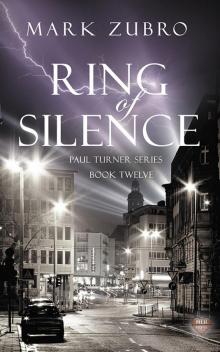 Ring of Silence
Ring of Silence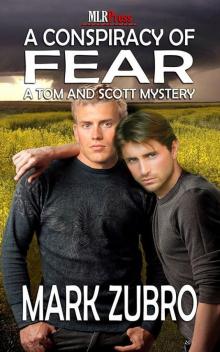 A Conspiracy of Fear
A Conspiracy of Fear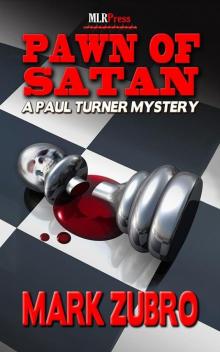 Pawn of Satan
Pawn of Satan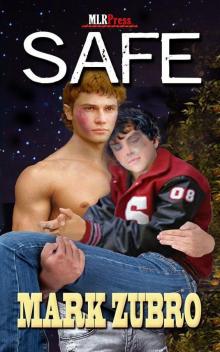 Safe
Safe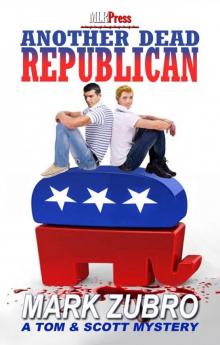 Another Dead Republican
Another Dead Republican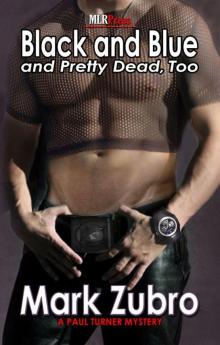 Black and Blue and Pretty Dead, Too
Black and Blue and Pretty Dead, Too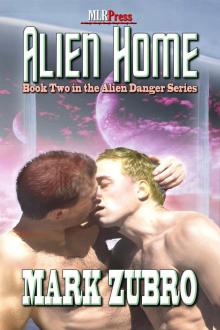 Alien Home
Alien Home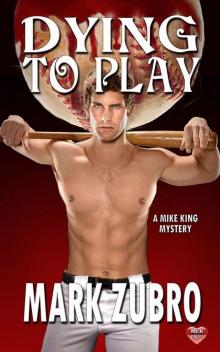 Dying to Play
Dying to Play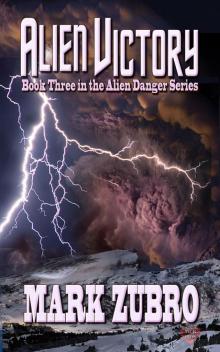 Alien Victory
Alien Victory